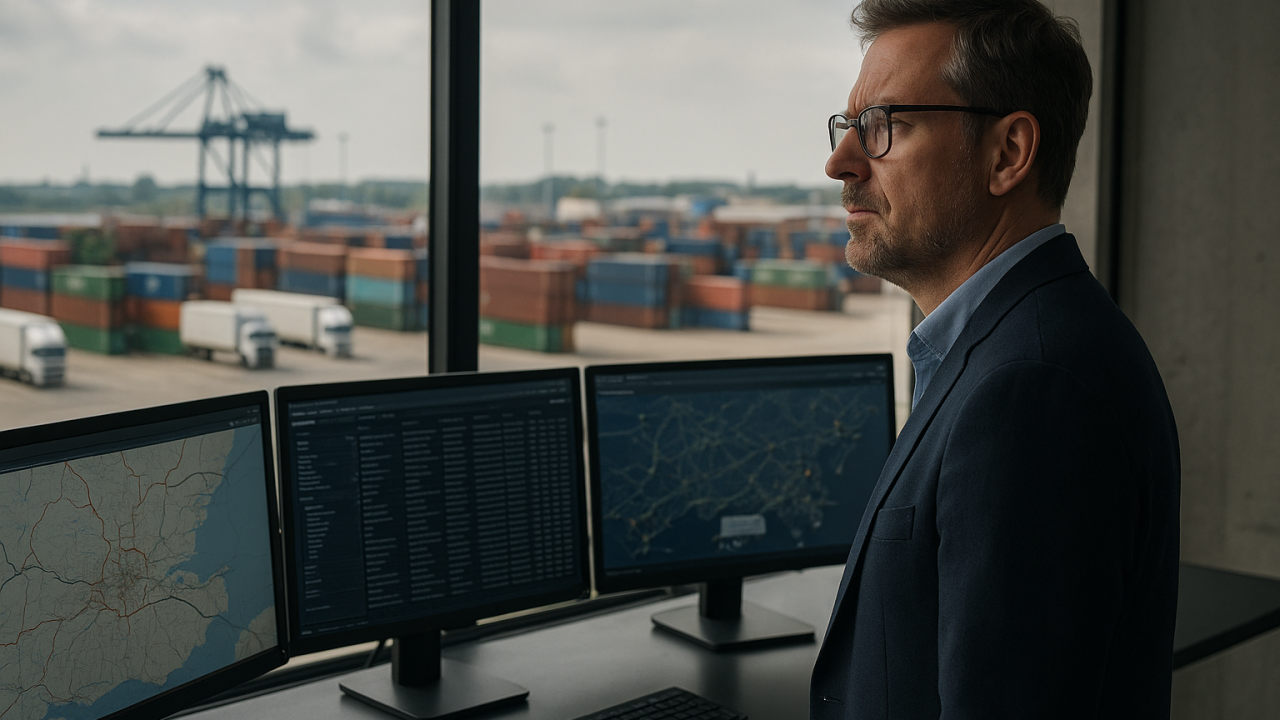In road freight, timing isn’t just everything—it’s the heartbeat of the business. Over the past years, I’ve seen how every delay, reroute, or shortage sends shockwaves through the supply chain. That’s exactly why I believe Artificial Intelligence (AI) is no longer a buzzword. For me, it’s the engine that transforms data into foresight—giving us the ability not only to react, but to anticipate and decide smarter.
Visibility: The Foundation for AI in Logistics
As a CTO, I often say: you can’t optimize what you can’t see. Traditional track-and-trace tells us where trucks are. But AI-driven visibility tells us what is likely to happen next. Think about predicting a border delay hours in advance or spotting patterns of congestion before they become critical. By connecting GPS, traffic feeds, weather forecasts, and order data into one coherent picture, AI gives us visibility that drives action—not just reports.
Decision Intelligence: Augmenting Human Judgment
I don’t see AI as a replacement for dispatchers or planners. Quite the opposite. AI strengthens their capabilities with Decision Intelligence: real-time insights that test thousands of scenarios and highlight the best next move. Should we reroute? Consolidate loads? Switch carriers? Instead of relying on yesterday’s KPIs or gut feeling, teams gain access to recommendations supported by data and probabilities. Decisions become faster, more consistent, and—ultimately—more profitable.
From Reactive to Predictive: My View on Crisis Management
If there’s one lesson logistics has taught me, it’s that disruption is now a constant. Geopolitical tensions, driver shortages, infrastructure bottlenecks—they’re no longer “black swan” events. Traditionally, crisis management has been reactive: wait until the disruption hits, then scramble. AI allows us to flip that script. With predictive models trained on history and fed with live data, we can recognize early warning signs:
- Congestion forming in a corridor
- Fuel scarcity in a region
- Imminent driver shortages at hubs This isn’t about firefighting anymore. It’s about mobilizing ahead of time and turning uncertainty into resilience.
Why the CTO Is Essential for AI Integration
I often get asked: “Why do we need a CTO to make AI work?” My answer is simple: AI in supply chains is not about buying software—it’s about integrating and orchestrating intelligence into the very fabric of operations. Studies by McKinsey and Deloitte underline what I’ve seen in practice: AI programs succeed when technology leadership sets the vision, defines the architecture, and ensures scalability. That’s the CTO’s job.
- Translating strategy into technology
- Safeguarding data quality and infrastructure
- Making sure AI scales from pilot to 24/7 operations
- Linking innovation directly to business value
Without that leadership, AI risks becoming a collection of controlled experiments. With it, it becomes a sustainable competitive advantage.
AI Doesn’t Take Years—It Takes Iteration
Another misconception I encounter: “AI projects will take years.” They don’t have to. In fact, waiting too long is the bigger risk. My philosophy is simple: start small, move fast, scale later.
- One lane. One customer. One KPI.
- Deliver quick wins: more accurate ETAs, fewer empty miles, sharper forecasting.
- Then expand step by step.
Gartner’s latest research confirms what I’ve experienced: companies that implement AI in small cycles see ROI 2.5x faster than those that wait for a “big bang.” AI isn’t a destination—it’s a system that evolves with every iteration.
My Vision: AI-Ready Supply Chains
Building an AI-ready supply chain isn’t just about tools. It’s about clean data, collaboration across functions, and the courage to rethink how we operate. The payoff is immense: logistics networks that are not only efficient, but adaptive, resilient, and customer-centric.
For me, the future of road freight isn’t about moving goods from A to B. It’s about anticipating the journey from A to B—before the truck even leaves the depot.
I’d love to hear your perspective: how is your organization approaching AI in logistics? If you’re exploring how to make your supply chain AI-ready, I support companies and boards in shaping the right strategy, selecting scalable technologies, and translating vision into tangible results.
Whether as a speaker, advisor, or partner on implementation, I help organizations move from ambition to execution—faster, smarter, and with measurable impact.




